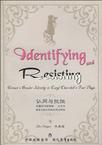认同与抗拒
出版时间:2007-5 作者:朱岩岩
Tag标签:无
内容概要
《认同与抗拒:英国剧作家凯瑞·丘吉尔剧本中的女性性别身份研究》从女权主义文学研究的角度,以当代英国女剧作家凯瑞·丘吉尔四个剧本为例,以循序渐进的方式讨论各剧本中主要女性角色如何通过对男性价值观的认同和抗拒来寻求自身发展。
论文首先从分析男性价值观中对女性的贬低开始,女性往往被看作“虚弱的身体”;不仅男性,而且女性自己也常将女性在社会和家庭中居于从属地位的原因归结为女性的生育责任和其它生理特征,如月经和子宫等。尼卓和格里丝达正是这样的女性,她们被动地认同男性价值观对女性的界定,屈从于弱势的社会地位,在婚姻中被当作交换的商品和生育机器。女性寻求自身价值的过程总是伴随着对男性定义的女性性别身份的反抗,这种反抗的形式多种多样,结果却往往未尽如人意。《醋汤姆》中的女性直接拒绝成为“男性目光”下的传统女性角色;乔安的反抗则更巧妙,她用“异装”的方式“篡夺”男性垄断的权利,不仅取得接受到良好教育,还凭借过人的学识成为教皇。女性的反抗还在父权社会最基本和核心的单位——家庭内部爆发。《九重云》中的贝蒂不愿意做“家里的天使”,她勇敢地走出家门寻求独立的社会地位和性觉醒,不仅如此,女性对家庭的颠覆还表现在同性恋等方面。更多的女性从对男性社会的直接反抗转向通过个人和事业发展谋求社会的成功和对女性的认可,如《主人们》的玛里恩和《上等女性们》中的玛琳,她们以成功女性自居,已然成为社会的“上等女性”。
至此,通过剧中女性角色的女性身份确立在经历了从认同一反抗的过程后,丘吉尔似乎看到了一条通向女性独立和发展的康庄大道,但是,再细读剧本,我们不难发觉这些女性角色抗拒结果是喜忧参半,而且剧作家在文本的字里行间隐约流露出对女性性别革命的担忧和不确定。
可怕的厄运如期而至;而玛里恩为了自己的事业没有给丈夫生孩子,却成为丈夫仇恨的目标,不止一次成为他幻想中要谋杀的对象;虽然玛琳凭借在事业上的努力成为“上等女性”,但是,她的成功既不能说服她的姐姐放弃家庭主妇的地位,更没有带动更多女性解放。
这些女性面临的困难不仅验证她们尴尬的性别处境,同时反映出剧作家自身对女性解放事业认识的局限性:女性到底应该如何确定女性自身性别身份和寻求女性社会价值。虽然,在丘吉尔的剧本中以及在现实生活中,女性最理想的性别身份仍然在争论中,我们的这个论题仍具有现实意义,即女性必须首先放弃对男性被动依从的地位,跳出认同男性价值的樊笼,才能发现和寻找自己的社会价值和性别意义。
作者简介
朱岩岩,1976年5月出生于山东省枣庄市,华东师范大学英语专业博士毕业,现为北京交通大学人文学院外语系教师。主要教授《英国文学选读》、《美国文学选读》和《英语戏剧赏析》等课程。研究方向为英美文学与西方戏剧,主要从文学理论的新鲜视角来解读戏剧和小说文本,具体研究角度包括:女性话语和女性写作、文化研究、心理分析和读者反映理论等。在学术论文方面,曾在《上海戏剧》《外国文学》等国内各级期刊发表论文十余篇,并参与编写多部教材。
书籍目录
Introduction 1
Chapter one
Male Expectation: the Weaker Vessel
Chapter Two
His Property: the Exchanged Commodity
Chapter three
A Transvestite: Usurping Male Power
Chapter four
Witches: Against Male Gaze
Chapter five
Subversion in the Family
Chapter six
Gender Identity of Career Woman
Conclusion
Works Cited
文摘
Coincidently, the silent women characters also appear inCaryl Churchill's plays and those women are socially neglectedlike that sign-language translator. In Top Girls, Churchill employsthe technique of silence and creates a silent waitress as a foil tothose hustling women. She serves Marlene and other five femaleguests throughout the dinner party but has no opportunity to speak.When those women guests have a warm conversation, the waitressconstantly comes and goes, serving food and drink they order, butsays nothing. None of those women guests on the stage takes anynotice of the waitress. Though there is no way for the audience toknow who the waitress is and what she is thinking about, her exis-tence on stage is highlighted by her always silence. It is obvious that the waitress's embarrassing situation is similar to that of the sign translator in Showalter's observation at the conference. Both of the waitress and the sign translator serve effective roles, but pitifully neither of them has their own voices.
In the beginning of Feminist Critique of Language, Deborah Cameron brings up the question directly "What does it mean that women are silent?" The question is based on her observation that "It cannot be that women are always and everywhere silent, nor obviously, that they lack the ability to use language" (3)Cameron's question finds an indirect answer in Alice Jardine's analysis of language. Jardine reveals the fact that there exists the difference between women's voice in public and private spheres and then accordingly she makes a division of public voice and private voice. She differentiates the two in the following way that "the public voice, for example, lecturing and teaching, has tradi- tionally been preserved for the male" while "the private voice with intimacy has been left for as the female".(73)
图书封面
图书标签Tags
无
评论、评分、阅读与下载
用户评论 (总计0条)
推荐图书
- 教育诞生天才
- 小学英语语法
- 家用洗衣机电脑程序控制器 (平装)
- 上海传奇
- AutoCAD 机械制图专家实例精讲
- 铁路货车安全监测与应用概论
- 世界自然奇观
- 铠甲勇士
- 好孩子的成长99%靠妈妈3
- 周氏养生保健手书集萃(全两册)
- 北方生态明珠城
- 电气绝缘材料 测定玻璃化转变温度的试验方法 (平装)
- 中国经济发展中的就业问题
- 2012-2013年金考卷特快专递 地理 第七期
- 精通嵌入式Linux编程
- UG NX三维造型设计教程与实例精讲
- SolidWorks Simulation基础教程
- AutoCAD 2010机械设计实例解析
- 商业服务业英语 (平装)
- AutoCAD 2010中文版建筑设计基础教程
- 中国城镇化与特色城镇化道路
- Q书架.阿拉丁Book.我的第一本幼儿小手工
- Q书架.阿拉丁Book.我的第一本幼儿小手工
- Photoshop CS4中文版标准实例教程
- 离网型风力发电机组、制动系统(第1部分:技术条件) (平装)
相关图书
- 一路走来
- 西北道教史
- 蛋制品加工增值技术
- 蛋制品加工实用技术
- 监督学
- 淀粉加工增值技术
- 别做聪明的傻瓜
- 食用菌和藻类加工增值技术
- 汽车车轮用铸造铝合金 (平装)
- 李强
- 卧式铣镗床精度检验条件 第1部分:固定立柱和移动式工作台机床 (平装)
- 创业指导/新农村新观念系列
- 妇产科护理学学习指南
- PETS全国英语等级考试教材.二级 (平装)
- 林风眠
- 研究生英语读写译教程(下册)
- 探求马克思
- 中华人民共和国企业所得税法配套规定
- 节能减排新途径与新技术
- 小城镇经济学概论
- 从人相看健康
- 英语学习成绩测试·2级(附磁带2盘)
- 培养孩子创造力的60种方法
- 钢琴天天练练进阶教程6 附CD二张
- 住宅卫生间功能及尺寸系列 (平装)
